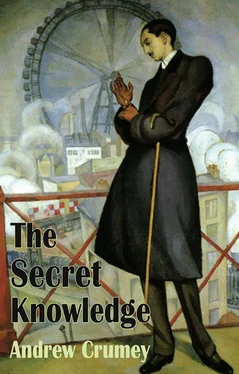From the lobby beyond the dining-room door, a minor commotion can be heard, of people entering at the command of a raised voice.
“They’re here,” says Yvette, and Carreau nods.
They are being made to sign the hotel register: Suner, with all the dignity of his station, is pointing an ink-blackened finger-tip at the place where the first of the refugees begins placing her name, then, when she is finished and steps back sorrowfully from the desk, the others follow. Carina Birman, Dele Birman (sister of above), Sophie Lippmann, Greta Freund, Henny Gurland, Joseph Gurland (son of above), Dr Walter Benjamin. Suner watches the last of them, the only man in the group, dot the letters of his name with a flourish that looks habitual but wearied. “You’re a medical man?”
“A doctor of literature.”
“What time did you set off from Banyuls this morning?”
“I didn’t,” Benjamin says wheezily. “I stayed overnight on the mountain and the others caught up with me.”
Suner can see that Walter Benjamin is not a well man. The date of birth on the passport he surrenders shows him to be forty-eight but he’s more like sixty. “You could have had a heart attack,” Suner says to him.
“I thank you for your solicitude.”
The policeman accompanying them gives a cough, reminding Suner that pleasantries are not appropriate now, there is business to be done. “Your rooms,” says Suner, pulling open the reservation book’s biblical mass and finding the evening’s arrangements. “You’ll all be doubling up, except for the professor.” It is a statement of fact, not a proposal, and having needlessly rechecked the allocations he personally made no more than ten minutes ago, a blessing at this low end of the season, he struts out from behind the desk, keys jangling in his fingers, and calls on José, the porter, who leads the prisoners and their guard upstairs. The luggage they carry is whatever they have managed to haul over the mountain, Dr Benjamin has only his briefcase; though had they been more heavily burdened, José still would not have carried anything for them.
All are to be deposited on the second floor, on a corridor otherwise empty of guests. José opens the first door, then nods at the boy and his mother, who follow the wordless prompt and step inside. The indolent porter leaves the door ajar, the key in place, and the policeman says something in Spanish that all the refugees can understand despite their almost total ignorance of the language. They are not to be locked in, but treated as free, since there is nowhere else for them to go.
The next two rooms are given to the four remaining women, then Benjamin is put in the last. He sees José and the policeman slouch complacently back along the corridor, shuts his door on them and goes to lie on the creaking bed, gazing only briefly at the stained striped wallpaper before closing his eyes, too tired even to remove his shoes or jacket. He thought he had bought his freedom with the papers in his briefcase. Yet his life is over.
Yvette watches her husband calmly finish the fish he has found so insufferably bland, a sip of wine easing its passage down his gullet.
“Aren’t you going to say something to the manager?”
“I’ll ask him to send the gentleman down to join us.”
“But is that wise, Louis?”
Pablo comes past; Carreau detains him and asks for Suner, who soon arrives to see what is wanted.
“They’re here, aren’t they?” says Carreau, and Suner nods, glancing across at the other diners who know nothing of the latest arrivals. “I’d like to see Dr Benjamin.”
Surprised, Suner raises an eyebrow. “You know him?” The Frenchman’s impassive response precludes further investigation; instead Suner stoops closer to his ear and says, “Under the circumstances, it would not be appropriate for him to be seen by the clientele…”
“Then I shall go to his room — which number?”
Suner straightens. “Twenty-three. On the second floor. I’ll get José to show you…”
“I shall find it,” Carreau interrupts. “I can count.” He begins to rise from the table, Yvette asks him if she should come too, but Carreau shakes his head. “There’s no need,” he says. “It’s a simple business arrangement, nothing more. Have some dessert, darling, I’m sure our host will be happy to help you choose.” Yvette and Suner watch speechlessly as he makes his way out of the dining room, the glass door closing behind him with an indignant bump, then he treads upstairs to find the scholar whose room is easy to locate, though Benjamin himself proves slow to respond to Carreau’s rapping. Eventually a muffled groan can be heard.
“It’s me, Carreau,” he calls impatiently. The door opens. “My God, you look terrible.”
Benjamin’s face is grey, his eyelids dark and pouchy, his lips strangely puckered, as if he has been kissing a ghost. He seems on the verge of collapse. “I don’t feel well,” he says. “My pulse…”
Carreau comes straight inside and closes the door. “Do you have it?” he asks in German.
“What? Yes.”
“Then let me see — we have very little time.”
Benjamin, bewildered by the rush, goes to sit again on the bed that creaks complainingly beneath his excessive weight. He puts a hand to his forehead. “Are you German, then, like me?”
“No.”
“You speak the language fluently.”
“As well as you speak French.” The remainder of their conversation is to be a mixture of the two, a situation Benjamin is used to: a stateless Berliner exiled in France, now seeking further exile in the United States.
There is a wooden chair in the room, but Carreau does not yet take it. He is glancing at the faded decor, assessing its provincial squalor. “Even worse than the restaurant,” he mutters, then to Benjamin, “Well?”
“All in good time, monsieur.” The briefcase is beside his feet on the floor. “What I want to know is why we were arrested.”
“It wasn’t part of the plan.”
“I know that. When you said on the telephone that you’d meet me in Portbou I didn’t think it would be under these circumstances. Many friends of mine have made exactly the same journey in the last few weeks, completely unhindered.”
“New regulations,” Carreau says, pulling the chair with a scrape and sitting down. “It’s not my fault.”
“But the item you want from me was supposed to buy my safe passage, that’s what you promised.”
“And I still give you that promise. All it takes is a bribe to the police chief here. Give me the book and everything will be taken care of.”
Benjamin laughs weakly. “Enough of this masquerade, Monsieur Carreau, or whatever your name is. There’s no need to try and restore my hope. I know this is the end, and you’ll get what you want, some pieces of paper. Only tell me why they matter so much to you.”
Carreau smiles without emotion. “I’m a collector.”
“Of Jews for the Gestapo?”
“Of first editions and rare manuscripts.”
Benjamin nods. “It’s a buyer’s market: fascism is so good for the economy.”
Carreau cares little for gallows humour. “I’m taking risks on your behalf. Whatever you might think, I’m not a Nazi. I really want to help you.”
“And my friends?”
“That was never part of the deal — you didn’t tell me you’d show up with a whole tribe.”
Benjamin shakes his head. “I only mean Henny and her son — we met the other four on the mountain, taking the same route.”
“And they don’t matter? They can go to blazes, is that it? Well, that’s most heroic.”
Benjamin stares at the bedcover he sits on and says nothing.
“So at least we understand each other. A deal is a deal. You, the woman and her son, as we negotiated. I have the train tickets in my pocket, and valid visas for the three of you.”
Читать дальше











